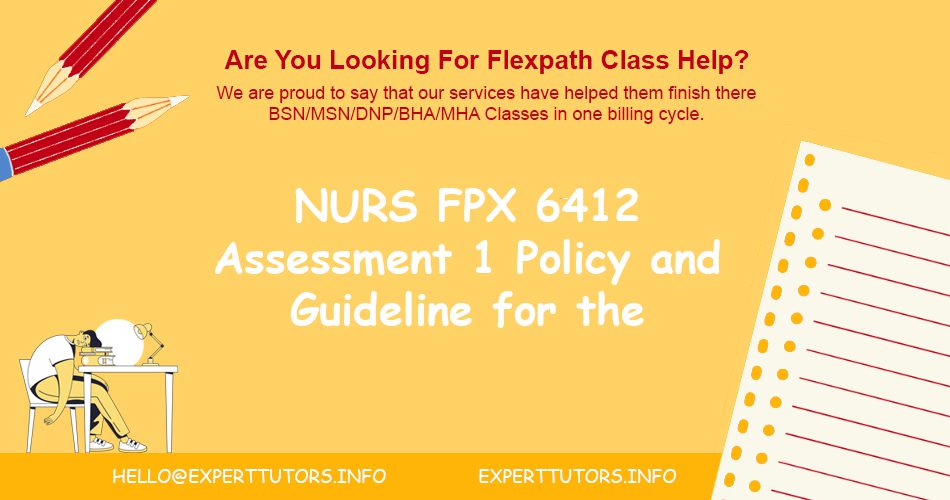Assessment 1 Policy and Guideline for the Informatics Staff: Making Decisions to Use Informatics System
Name
Capella University
Dr. Name
March, 2024
Policy and Guidelines for the Informatics Staff: Making Decisions to Use Informatics System
The eTAR is a vital EHR component, an integral part of modern healthcare systems. EHR technology collects patient data and distributes it efficiently across healthcare settings through the seamless integration of digital technology.
Functions
Below are pivotal functions performed by Electronic Treatment Administration (eTAR) within a healthcare setting:
- eTAR supports multidisciplinary collaboration among healthcare professionals, enhancing clinic efficiency and communication.
- Improves system and record quality, positively affecting healthcare providers’ performance and patient care quality through better access to patient records.
- Policies and guidelines focus on enhancing healthcare quality and reducing errors, improving data collection and distribution for evidence-based practice (Lage et al., 2022).
- Aids in accurate documentation of medication and treatment, maintaining up-to-date records, and issuing vital patient assessment alerts.
- eTAR is used for acute and post-acute patient care. It prepares treatment session lists and creates comprehensive e-charts with detailed patient information.
- Enhances patient safety by minimizing human errors in patient information registration and medication routes, thereby improving the patient experience.
- Supports informed decision-making and maintains transparency in medication and treatment administration, leading to improved healthcare outcomes (McGrath et al., 2022).
Evaluation of Tool Functionality in Supporting Evidence-Based Practice
The Electronic Treatment Administration (eTAR) system significantly enhances nursing services by implementing a paperless approach for both acute and chronic patient care. It organizes patient treatment plans based on various factors like location and treatment method. The system efficiently manages patient data, including treatment histories and specific medication requirements. For patients without previous medication records, eTAR offers flexible options. It efficiently tracks treatment compliance and prompts for necessary actions, such as reordering insufficient medications. The system concludes sessions by generating detailed summaries of the treatments provided and monitoring adherence to prescribed regimens (Hada & Coyer, 2021).
Guidelines depicting Analysis of Work Setting
The eTAR system enhances the reliability of patient experiences within the healthcare framework by ensuring accurate documentation, which helps mitigate any potential discrepancies. It safeguards patient health records against human errors, which could occur during the process of recording patient details, health conditions, and medical updates. The system comprehensively covers all aspects of healthcare delivery, including the documentation of both executed and unfulfilled medical and surgical orders, thereby maintaining a complete and up-to-date electronic health record (EHR) for each patient (Contreras et al., 2021)This thoroughness in documentation not only aids healthcare providers in managing care delivery but also facilitates seamless communication between nurses and doctors.
Electronic Treatment Administration (eTAR) Reinforcing Strategic Plan
eTAR plays a pivotal role in enhancing strategic planning for patient care, focusing predominantly on patient safety. This system effectively employs technology to streamline data registration, thus boosting efficiency and accuracy in healthcare settings. The process of integrating new medical orders within the system is time-bound, with a specified completion period, ensuring prompt attention to patient needs. Importantly, eTAR supports the validation of patient data, reinforcing its credibility as a reliable healthcare platform. Patients engage with the system to verify their data, ensuring it is securely handled and only shared with authorized personnel, reflecting a commitment to patient data confidentiality and empowerment. By providing access to treatment history, eTAR empowers patients with knowledge about their healthcare journey. The Clinical Decision Support (CDS) function of eTAR further enhances the quality of care by providing healthcare providers with access to validated data, enabling more informed and effective patient care strategies (Gottlieb et al., 2020)
Enhancing Healthcare Workflow Efficiency with eTAR
eTAR, a digitized healthcare system, streamlines care delivery with its advanced features. It simplifies navigation to eCharting sessions with quick links, maintaining current orders through monthly recaps. The system adds an extra layer of security with two-step verification for patient data access. Its user-friendly interface makes patient data management more efficient. Essential information, such as drug details, clinical instructions, and safety warnings, is readily available upon software installation. eTAR also flags medications, ensuring a thorough review of patient vitals, and alerts medical staff when these vitals need reassessment. Priority is given to the latest requirements or PRN orders, visible for the first 72 hours to facilitate prompt attention (Skeff et al., 2022). The integration of barcoding technology secures and organizes patient information effectively. By automating various processes and providing critical updates and reminders, eTAR aids nurses in multitasking, reducing the potential for human error in managing medications and surgical procedures.
eTAR Contribution to Inter-Professional Care
eTAR plays a pivotal role in enhancing interprofessional collaborative practice in healthcare. It serves as a critical tool within Electronic Health Record systems, like eMAR, to bolster teamwork and communication among healthcare professionals. By providing streamlined access to patient information, eTAR empowers various healthcare team members, including nurse informatics specialists and physicians, to engage in more effective coordination of patient care. Its functionalities allow for the tracking and verification of care quality, and the system’s reports, such as late orders, PRN results, and upcoming medication schedules, ensure that all team members are consistently informed and aligned in their efforts (Roth et al., 2021).
NURS FPX 6412 Assessment 1 : Policy and Guideline for the Informatics Staff: Making Decisions to Use Informatics System Conclusion
This research acknowledges eTAR as a proficient tool within Electronic Health Records (EHR) for managing and updating patient data efficiently. It enhances patient safety by accurately tracking medication and various treatment procedures. With features like barcode generation and secure verification methods, eTAR ensures the safety of patient information. It empowers patients by providing them easy access to their own health data. Additionally, the system is designed to send reminders for regular health check-ups and medication schedules, thereby improving the overall performance of healthcare delivery (McConeghy et al., 2021).
NURS FPX 6412 Assessment 1 : Policy and Guideline for the Informatics Staff: Making Decisions to Use Informatics System References
Contreras, B. P., Hoffmann, A. N., & Slocum, T. A. (2021). Ethical Behavior Analysis: Evidence-Based Practice as a Framework for Ethical Decision Making. Behavior Analysis in Practice, 15(2), 619–634.
Gottlieb, M., Holladay, D., Burns, K. M., Nakitende, D., & Bailitz, J. (2020). Ultrasound for airway management: An evidence-based review for the emergency clinician. The American Journal of Emergency Medicine, 38(5), 1007–1013. https://doi.org/10.1016/j.ajem.2019.12.019
Hada, A., & Coyer, F. (2021). Shift-to-shift nursing handover interventions associated with improved inpatient outcomes-Falls, pressure injuries and medication administration errors: An integrative review. Nursing & Health Sciences, 23(2), 337–351. https://doi.org/10.1111/nhs.12825
Lage, I., McCoy, T. H., Jr, Perlis, R. H., & Doshi-Velez, F. (2022). Efficiently identifying individuals at high risk for treatment resistance in major depressive disorder using electronic health records. Journal of Affective Disorders, 306, 254–259. https://doi.org/10.1016/j.jad.2022.02.046
McGrath, A., Murphy, N., & Richardson, N. (2022). ‘Sheds for Life’: delivering a gender-transformative approach to health promotion in Men’s Sheds. Health Promotion International, 37(6), daac150.
McConeghy, K. W., Cinque, M., White, E. M., Feifer, R. A., Blackman, C., Mor, V., Gravenstein, S., & Zullo, A. R. (2021). Lessons for deprescribing from a nonessential medication hold policy in US nursing homes. Journal of the American Geriatrics Society, 70(2), 429–438. https://doi.org/10.1111/jgs.17512
Roth, I., Wells, R., Highfield, L., Cuccaro, P., Misra, S., & Engebretson, J. (2021). Implementing an inpatient integrative medicine consult service for children with pain: A qualitative analysis. Complementary Therapies in Medicine, 58, 102698. https://doi.org/10.1016/j.ctim.2021.102698
Skeff, K. M., Brown-Johnson, C. G., Asch, S. M., Zionts, D. L., Winget, M., & Kerem, Y. (2022). Professional behavior and value erosion: A qualitative study of physicians and the electronic health record. Journal of Healthcare Management / American College of Healthcare Executives, 67(5), 339–352.
Stuber, F., Seifried-Dübon, T., Rieger, M. A., Gündel, H., Ruhle, S., Zipfel, S., & Junne, F. (2021). The effectiveness of health-oriented leadership interventions for the improvement of mental health of employees in the health care sector: a systematic review. International Archives of Occupational and Environmental Health, 94(2), 203–220. https://doi.org/10.1007/s00420-020-01583-w
Appendix A
Policy
The suggested eTAR technology incorporated into the healthcare policy is elucidated as follows:
Overview
eTAR, an Electronic Health Record (EHR) tool, plays a vital role in modern healthcare by maintaining and updating patient data. Its design and application are centered around enhancing patient safety and data accuracy. The system is equipped with features like barcode generation and secure verification processes to ensure the confidentiality and integrity of patient data.
Purpose
This policy aims to elevate the standard of healthcare services, facilitating healthcare providers’ roles while minimizing human error. By integrating technology into healthcare, it transforms the industry landscape, leading to enhanced data handling, including collection, distribution, and utilization, as well as automating various healthcare processes. The policy is particularly relevant for multidisciplinary healthcare teams, supporting them in delivering efficient and accurate care. In essence, eTAR is designed to be a cornerstone in the modernization of healthcare, bridging the gap between technology and patient-centered care. (Stuber et al., 2021).
Responsibility
- Healthcare professionals, including IT specialists, nurses, and physicians, must ensure the integrity and accuracy of the data within the eTAR system.
- Regular training and updates are essential for healthcare staff to utilize the eTAR system’s features and capabilities effectively.
- Professionals are responsible for utilizing eTAR to facilitate patient-centered care, ensuring timely access and management of patient health records.
Guidelines
Under a strategic foreign policy framework, comprehensive guidelines have been developed to enhance the effectiveness and widespread adoption of eTAR in the global healthcare sector. These guidelines are formulated with the objectives of minimizing medical errors, bolstering patient safety, and accurately recording health outcomes through this technology.
Key directives for eTAR usage include:
- Acquiring fundamental computer and technology skills.
- Ensuring robust internet connectivity for uninterrupted system access.
- Strict adherence to patient safety and data privacy norms in documentation and data retrieval.
- Thorough verification of patient history prior to data entry and during transfer processes.
- Gathering comprehensive background information about prescribed medications and services for patients prior to their application.
- End-users are tasked with maintaining the updated protocols and integrating them into practice.
- Checking and updating timelines for medication administration and medical procedures as reminders in the system.
- Promoting patient satisfaction through effective and clear communication channels.
- Regularly inspecting the digital platform for any technical issues or anomalies.




